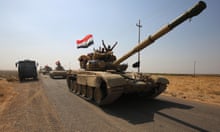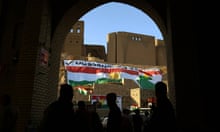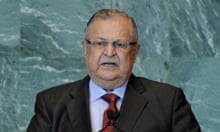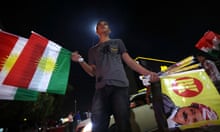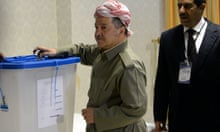Thousands of people in the Kurdish region of northern Iraq have cast votes in a referendum billed as a first step towards independence from Baghdad, defying regional demands that the ballot be abandoned and international fears that the outcome could spark violence.
As voting stations closed, more than 80% of registered voters had cast ballots in a poll that many felt went beyond the demands of Iraq’s Kurdish north to buttress the cause of Kurds across the region.
Leaders in Erbil had tried to confine aspirations to within the Kurdish regional government’s current boundaries in Iraq. However, Iran, Turkey and Baghdad fear the ballot could provide momentum to restive Kurdish movements and potentially destabilise borders elsewhere in the region.
Iraq’s parliament on Monday debated a motion to send troops into disputed areas south of Kirkuk that were contentiously included in the referendum.
In Kirkuk, a multi-ethnic oil city 60 miles south of Erbil, Kurdish areas were brimming with voters, many wearing celebratory clothes or traditional costume. “This is better than [the Islamic festivals],” said Abdul Kareem Kakarash, 62, a blacksmith. “It is the best day of my life.”
His relative Mala Rasul Mamish, 40, said: “I hope that the west will see this as a historic day, and not just the project of one political party. It is much more than that. So much of our blood has been spilled for being Kurds. The Iraqi government has done to us things that even infidels wouldn’t do.”
The ballot is widely expected to deliver an overwhelming yes for independence – a boost for the de facto Kurdish president, Massoud Barzani, who had invested much of his political capital as leader in putting Iraq’s Kurds on a pathway to independence.
Barzani had repeatedly ignored calls from neighbouring countries and from the US, Britain, the EU, UN and Arab League that he abandon the vote in favour of more talks with Baghdad.
Turkey’s president, Recep Tayyip Erdoğan, said his country could cut a pipeline that allows the Iraqi Kurds to export oil to the outside world – much of it from Kirkuk fields – and generates significant revenue for the Kurdistan regional government. Iran banned flights to Erbil and shut its airspace to flights to and from the city’s airport.
Though the result is non-binding, Iraq’s central government views the ballot as a potential trigger for disintegration of the fragile state, which has been battered by 14 years of war and instability – the last three of which have been consumed by battling Islamic State.
Barzani’s calculation was that the fight with the terror group gave him leverage that he would not otherwise have had. However, Baghdad seems less inclined than ever to offer concessions in the event of a result that moves the semi-autonomous north further from its orbit and adds new complications to already stalled deals on oil and revenue sharing.
Kirkuk, contested for centuries between Kurds, Arabs and Turkmen, looms as a flashpoint in coming months, with Shia militias loyal to Iran and Baghdad just to the south of the city.
“They’re only 1km away,” said a peshmerga soldier at the last checkpoint to the south of the city. “We won’t let them get here.” A driver for the peshmerga was killed and a trooper wounded by gunfire in the town of Tuz Khurmatu just after noon on Monday, after a brief standoff with Shia forces, said Major Kamal Abdullah, the head of Kurdish security forces in the town.
In the city itself, Hasiba Abdullah, 51, who supervised a polling station in a Kurdish neighbourhood, said of the vote: “It’s a dream come true for everyone. We want the Kurdish flag to rise over all our communities here. They will all be included. We are ready to set aside all disputes and take our east in the global community. We want to see our flag at the United Nations.”
Across Kirkuk, in an Arab suburb, Abu Ahmed, 61, an oil worker who did not vote, said: “Some people are not going to vote. There is more interest for the Kurds to vote. It’s less likely in the Turkmen and Arab areas.”
In a nearby polling station, Amid Najmedin said about 10% of registered voters had turned up by noon. “Arabs are not coming to vote,” he said. “The Iraqi government has been threatening people. Because of their pressure, others do not feel comfortable to participate.”
The US, a key ally of Iraq’s Kurds, has warned the vote is likely to destabilise the region. On Sunday the Iraqi central government demanded that all airports and borders crossings in the Kurdish region be handed back to federal government control.
In a televised address from Baghdad on Sunday night, the Iraqi prime minister, Haider al-Abadi, said: “The referendum is unconstitutional. It threatens Iraq, peaceful coexistence among Iraqis and is a danger to the region.”
He added: “We will take measures to safeguard the nation’s unity and protect all Iraqis.”
Initial results from the poll are expected on Tuesday, and the official results will be announced later in the week.
Additional reporting: Mohammed Rasool.


